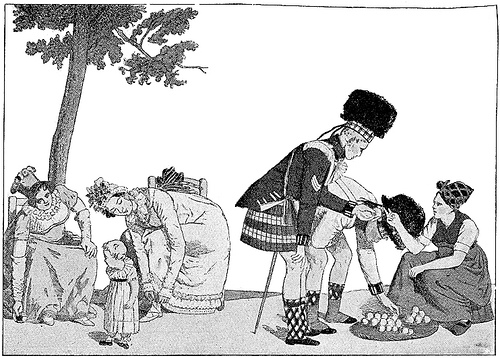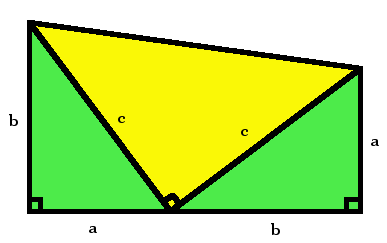
“Kilt Curiosity,” caricature, continental Europe, circa 1815.
Spike Milligan was wearing traditional Scottish garb when a curious onlooker asked, “So, is there anything worn under the kilt?”
“No,” he answered, “it’s all in perfect working order.”

“Kilt Curiosity,” caricature, continental Europe, circa 1815.
Spike Milligan was wearing traditional Scottish garb when a curious onlooker asked, “So, is there anything worn under the kilt?”
“No,” he answered, “it’s all in perfect working order.”
Make of this what you will — it’s a certificate signed in the 1750s by 11 witnesses, including two representatives of the Sorbonne and a counselor to the French parliament:
We, the undersigned, … certify that we have this day, between the hours of eight and ten o’clock in the evening, seen Marie Sonet while in convulsion, her head on one stool and her feet on another, the said stools being entirely within a large fire-place and under the mantel-piece, so that her body was in the air above the fire, which burned with extreme violence, remaining in that position for thirty-six minutes in four different times, (nine minutes each time) without the cloth in which she was wrapped (she was without other clothes) being burned, although the flames sometimes extended above her—the which appears to us to be quite supernatural.
And: “Again, we certify that while we were signing the present certificate, the said Sonet placed herself over the fire in the manner previously described, and remained there nine minutes, appearing to sleep above the brazier, which was very hot, having been replenished with fifteen large logs, and a faggot of kindling wood, during the last two hours and a quarter.”
(Cited in William Hammond, On Certain Conditions of Nervous Derangement, 1881.)

Terror and horror, from Darwin’s The Expression of the Emotions in Man and Animals.
Ann Radcliffe wrote: “Terror and horror are so far opposite, that the first expands the soul, and awakens the faculties to a high degree of life; the other contracts, freezes, and nearly annihilates them.”
Or, in Devendra Varma’s words, “The difference between Terror and Horror is the difference … between the smell of death and stumbling against a corpse.”
A gentleman who was in the habit of interlarding his discourse with the expression ‘I say,’ having been informed by a friend that a certain individual had made some ill-natured remarks upon this peculiarity, took the opportunity of addressing him in the following amusing style of rebuke:–‘I say, sir, I hear say you say I say “I say” at every word I say. Now, sir, although I know I say “I say” at every word I say, still I say, sir, it is not for you to say I say “I say” at every word I say.’
— Charles Carroll Bombaugh, Gleanings for the Curious from the Harvest-Fields of Literature, 1890
What’s the most remote capital city in the world?
It’s a tie: Canberra, Australia, and Wellington, New Zealand, are 1,448 miles … from each other.

The horizontal lines are parallel.
It is a well known and easily demonstrated scientific fact that different people sound different vowels when laughing, from which fact a close observer has drawn the following conclusions: People who laugh in A (pronounced as ah) are frank, honest, and fond of noise and excitement, though they are often of a versatile and fickle disposition. Laughter in E (pronounced as ay) is peculiar to phlegmatic and melancholy persons. Those who laugh in I (pronounced as ee) are children or simple-minded, obliging, affectionate, timid, and undecided people. To laugh in O indicates generosity and daring. Avoid if possible all those who laugh in U, as they are wholly devoid of principle.
— Henry Williams, A Book of Curious Facts, 1903

We’ve had some pretty smart presidents. James Garfield devised this proof of the Pythagorean theorem in 1876, while serving in the House of Representatives:
The area of the trapezoid above is

The area of each green triangle is

And the yellow triangle is

So:

Suppose we hold an election with three candidates, X, Y, and Z. And suppose the voters fall into three groups:
Group 1 prefers, in order, X, Y, Z
Group 2 prefers, in order, Y, Z, X
Group 3 prefers, in order, Z, X, Y
Now, if Candidate X wins, his opponents can rightly object that a majority of voters would have preferred Candidate Z. And corresponding arguments can be made against the other candidates. So even though we’ve held a fair election, it’s impossible to establish majority rule.
The Marquis de Condorcet noted this oddity in the 1700s; it’s sometimes known as Condorcet’s paradox.
Epitaph in the churchyard of Llangerrig, Montgomeryshire:

— Charles Bombaugh, Facts and Fancies for the Curious From the Harvest-Fields of Literature, 1860